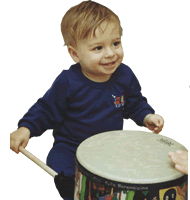|






|
|
Why Music?
Music is ...
Fun!
Quality learning and maximum participation occur when people experience the joy of play that music encourages.
|
 |
Success-oriented
The music activities are designed to be success-oriented, setting up each client to grow with every experience.
A natural
Music inherently uses pitch, rhythm, breath, diction, and thus may address many areas being worked on with a speech-language pathologist.
Growth-oriented
Music encourages socialization, communication, self-expression, and motor development.
Neural nourishment
Because the brain processes music in both hemispheres, music can stimulate cognitive functioning and may be used for remediation of some speech/language skills. In addition, musical experiences & abilities are stored in different parts of our brain than speech abilities are. Therefore, some brain damage affects speech but not singing ability. We can learn to use our “musical pathways” to reinforce or rebuild the neural pathways for speech.
Multi-modal
Music stimulates all of the senses and involves the client at many levels. This multi-modal approach facilitates many developmental skills.
Another way to communicate
Music gives us alternative forms of expression and experience. Music can be a non-verbal form of communication, regardless of one’s musical abilities. |



